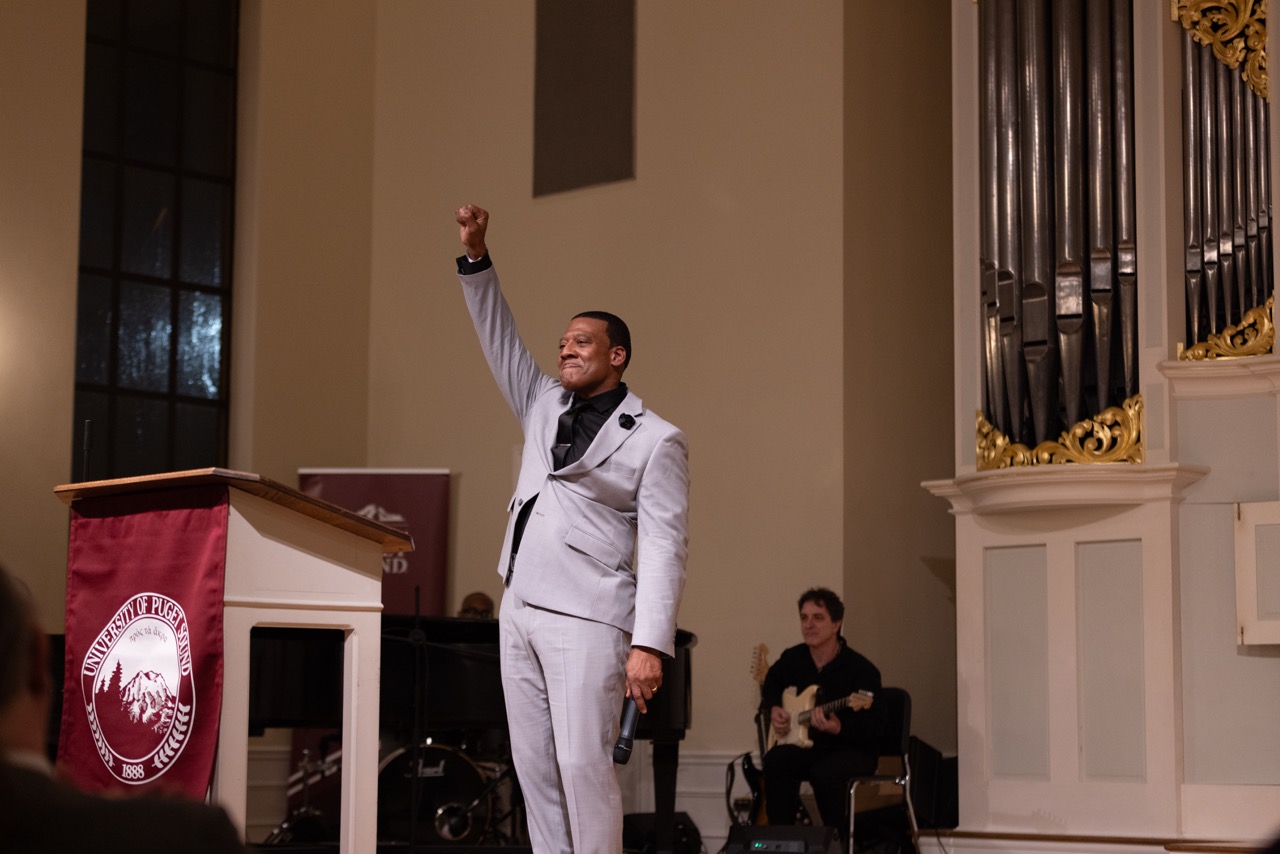
By Max Orr
On Thursday, Jan. 23, a crowd gathered in Kilworth Memorial Chapel to hear the words of Reverend Doctor Leslie Braxton (‘83). The Office of Institutional Equity and Diversity (OIED) hosted the event in collaboration with the Swope Endowed Lectures for the University’s 39th annual Martin Luther King Jr. Celebration. The talk was entitled “Martin Luther King Jr.: A Model of Moral Leadership in an Immoral Empire.” Rev. Dr. Braxton was joined by other noteworthy speakers, including the Vice President for Institutional Equity and Diversity, Dr. Lorna Hernandez Jarvis; the current president of the Black Alumni Union, Louis Smith (‘69); and current president of the Black Student Union (BSU), Bella Clinton (‘27). The evening was filled with community and music, led by the Songs of Black Folk choir. Leaving Kilworth that night, the collective sense of renewed resilience was palpable.
Rev. Dr. Braxton’s speech came at a time of reckoning in America. Jan. 20 saw the combination of two incredibly symbolic events in American culture: the observation of the birthday of Dr. Martin Luther King Jr. and the inauguration of Donald J. Trump to his second term as president. Rev. Dr. Braxton describes it as “two seemingly oxymoronic occasions. The federal recognition of the birthday of a prophetic dreamer sent here by God to this nation to confront her contradictions and push her to be what she said she was on paper and the inauguration of a racist, misogynistic, neofascist, habitually lying gangster.”
Rev. Dr. Braxton continued that we must contend with the fact that America was founded on a lie: liberty for all. “A room full of enslavers writing and signing a document whose watchword was liberty,” he said. We wonder why we have so much division in our country today, and as Rev. Dr. Braxton points out, “if you’ve got more than one vision in the house, you’ve got division in the house.” Since its inception, the United States has contradicted its founding principle and sewn division into its very fabric. It is imperative that we choose to correct that original contradiction in our founding documents in order to work towards being a ‘moral nation.’
In his speech, Rev. Dr. Braxton defined a ‘moral nation.’ “I contend to you, my brothers and sisters, that a moral nation is a nation that chooses over and over again as many times as it takes to stay on course toward the destiny that they said brought them to existence.” Did we choose to stay the course of our stated destiny on Nov. 5? Rev. Dr. Braxton would answer: no.
How do we redirect our course and ensure that our nation chooses equity and inclusion instead of racism, misogyny, neo-fascism and general hate? Smith and Clinton offered invaluable insight into the perseverance needed to lead their respective associates in a hostile political environment. Smith, a founding member of the Black Student Union in the fall of 1967, emphasized the need for a Black community on an overwhelmingly white campus. “If we wanted to continue to be successful, that support needs to be coming from somewhere, and if it wasn’t coming from the school, if it wasn’t coming from the surrounding community, we felt the need to have to create it ourselves,” Smith said. During his speech, Smith spoke about the response of the BSU to the murder of Martin Luther King Jr. in the spring of 1968. He referenced the feeling of being “drawn together by a magnetic field” to support each other in a time of immense pain for the Black community. He also mentioned their renewed drive to make things better, and their vow to further Dr. King’s dream together.
Clinton agreed that the BSU continues to have that role on campus today, almost six decades later. “Our first meeting after the election results came in was just like a safe space, if anyone had to talk, talk it out,” Clinton said. “As more happens in the world, more policies are made and changed, and things are given and taken away, that BSU could have more of a safe space,” she continued. Spaces for marginalized communities will continue to gain importance as this administration enacts its planned policies. These groups will be centers for community support and action as we respond to the new political situation we live in.
How do we move forward and steer the country towards choosing equity, and reaffirming liberty for all? Spaces that inspire resilience, including communities found on our campus, give people the opportunity to choose liberty for those not included in that original vision. Rev. Dr. Braxton said it is the responsibility of young people to make that decision – “Regardless of what other generations have said, what will you say?” We have an opportunity as a campus to be part of that mission. What will we say?
